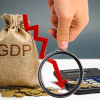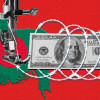Bangladesh economy to grow below 6% for two consecutive years: World Bank

Bangladesh's real GDP growth is projected to remain relatively subdued at 5.6 percent in the current fiscal year, compared to the average annual growth rate of 6.6 percent over the decade preceding the Covid-19 pandemic, the World Bank (WB) said today.
Relatively slower growth is projected to persist in the next fiscal year of 2024-25, at 5.7 percent, driven by a modest recovery in private consumption supported by a moderation in inflation, said the Washington-based lender in its Bangladesh Development Update.
"Investment recovery will need support from improved implementation of large public investment projects."
The WB said persistent inflation is expected to weigh on private consumption growth, and shortages of energy and imported inputs combined with rising interest rates and financial sector vulnerabilities are expected to dampen investor sentiment.
On the supply side, this will be reflected in higher industrial growth, even though services growth is expected to remain subdued.
"Growth is expected to increase gradually over the medium-term as monetary, exchange rate, financial and structural reforms are implemented."
The WB said even though political uncertainty has diminished with a new cabinet taking oath after the national elections held in January 2024, downside risks to the outlook are significant.
"Inadequate progress in monetary and exchange rate reforms may result in a further decline in foreign exchange reserves and persistent inflationary pressure."
Tighter liquidity conditions could exacerbate vulnerabilities in the banking sector. Fiscal risks include a revenue shortfall, potential financial sector fiscal liabilities, and deficit monetisation, it said.
"Expediting structural reforms are needed to promote economic diversification and integration into Global Value Chains (GVCs) and strengthen resilience over the medium to long term. Critical reforms include developing the intellectual property rights (IPR) regime and strengthening the framework for foreign direct investment."
An efficient resolution framework for non-performing loans (NPLs) is urgently needed, the WB said.
In this regard, it said, conducting a comprehensive asset quality review of the largest banks, establishing legal frameworks for the creation of an NPL market, strengthening corporate governance of the state-owned commercial banks, and efficiently implementing regulations such as the Prompt Corrective Action framework for weak banks are crucial steps.

 For all latest news, follow The Daily Star's Google News channel.
For all latest news, follow The Daily Star's Google News channel. 









Comments